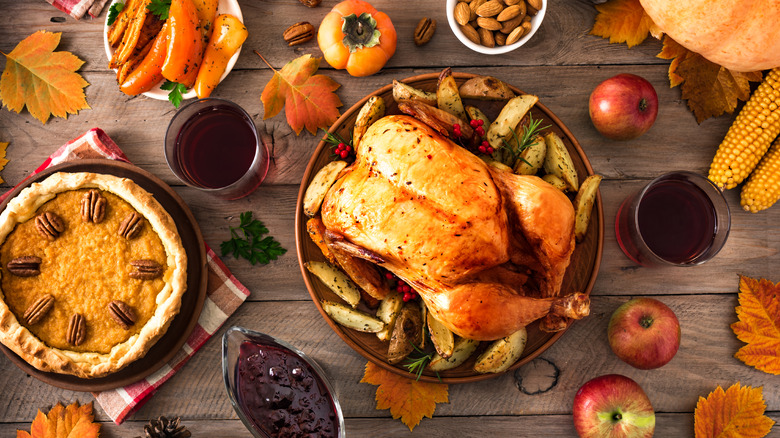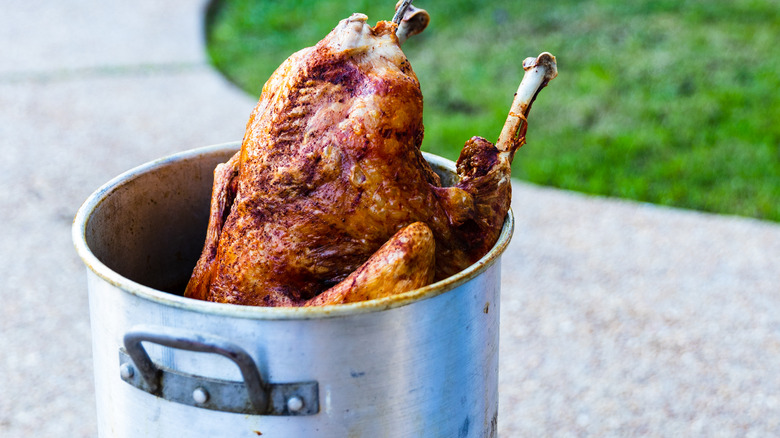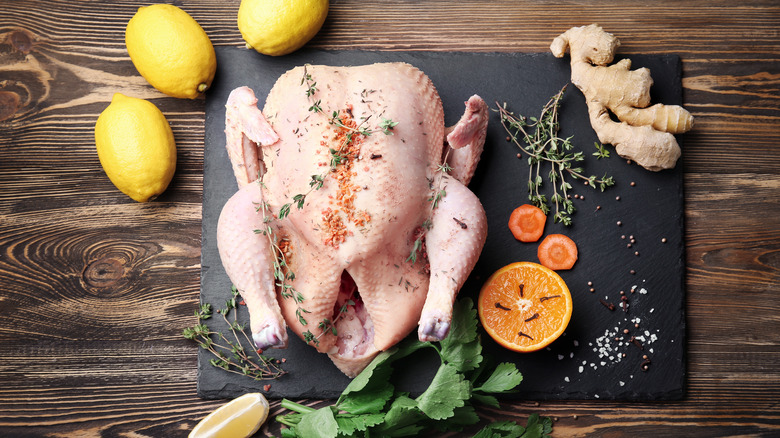The Most Dangerous Way To Cook A Turkey
"No citizen of the U.S. shall refrain from turkey on Thanksgiving Day," Alexander Hamilton reportedly said (from USA Today). And Americans have certainly heeded that call. 88% of Americans are expected to eat turkey for Thanksgiving to the tune of $297 million (from University of Illinois Extension).
And we can trace the history of turkey for Thanksgiving from the country's New England settlers. Historian Ashley Rose Young told CNBC, "Turkey became the national dish that we eat on Thanksgiving through a decades and century-long process of the regional foods of New England consumed during traditional harvest festivals, making their way through the United States as Americans living on the east coast and in the U.S. south moved westward over time."
Turkey has solidified itself as the main dish of choice for Thanksgiving, and there are a myriad of ways to prep and cook the bird, from brining or stuffing to roasting or deep frying. And while there's all kinds of yummy options, it turns out that cooking your turkey can take a turn for the dangerous if you're not careful.
Deep frying a turkey is easy to get wrong
We all want to look back on our Thanksgiving celebrations as being all about good food and good company, but for some families, they'll tell the story of the year they caught the house on fire. The National Fire Protection Association confirms that Thanksgiving is the number one day for kitchen fires with fire departments in 2019 responding to 1,400 kitchen fires.
One of the ways to cut down on Thanksgiving fires is to not leave your cooking unattended and to skip deep frying the turkey. Deep frying can get you a tasty turkey, but it can also cause some serious damage.
Putting the turkey into hot oil can cause oil to spill out of the fryer and onto the heat source, causing a fire (via FDNY Smart). And if you put a frozen turkey into hot oil, no matter how carefully, it will explode (from The Daily Beast).
Handling the turkey fryer when hot can cause accidental hot oil spills or burns, and the oil can catch on fire if it gets over 400 degrees (from Copeland's).
Bacteria growth in turkey will cause food poisoning
While not as dramatic as a fryer fire, there's another way cooking your turkey can be dangerous. Avoiding bacterial growth, like salmonella, is key. If you have a frozen turkey, make sure to thaw it in the refrigerator; bacteria growth can happen when the turkey is left out for more than two hours at between 40 and 140 degrees (from CDC).
Another way you may get bacterial growth is with the slow cooking method. If you're having a traditional Thanksgiving meal, Thanksgiving Day itself may be hectic with trying to get everything ready. So you might be tempted to slow cook your turkey overnight to save yourself some time (from Williams-Sonoma). But that could be dangerous.
Slow cooking the turkey means turning the oven temp to around 190 to 200 and leaving it in for 12 hours or so, but with that low temperature, the turkey takes longer to cook which leads to a higher risk of bacterial growth, which leads to food poisoning (from MSU Extension). The USDA recommends cooking your turkey at 325 or 350 degrees until the internal temperature is 165 degrees.


